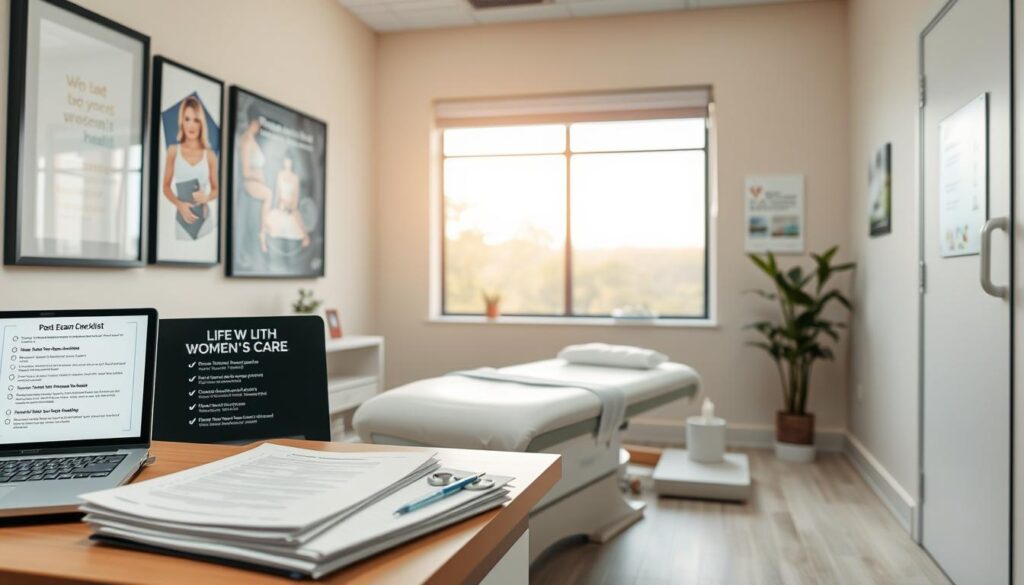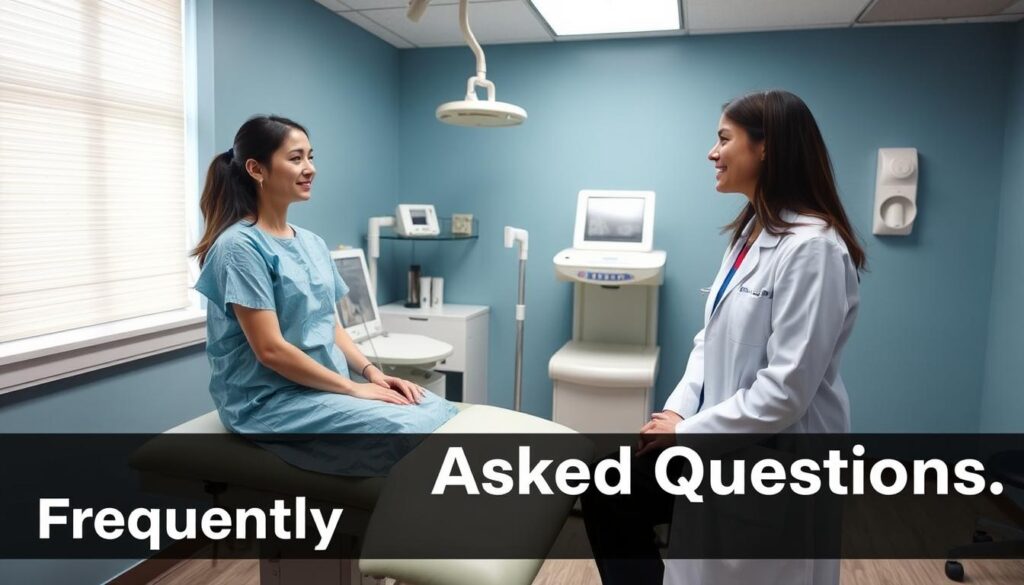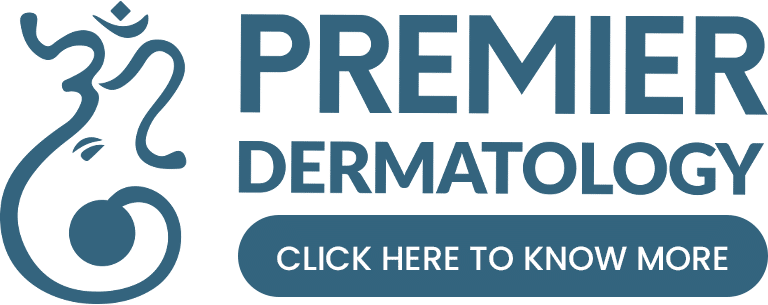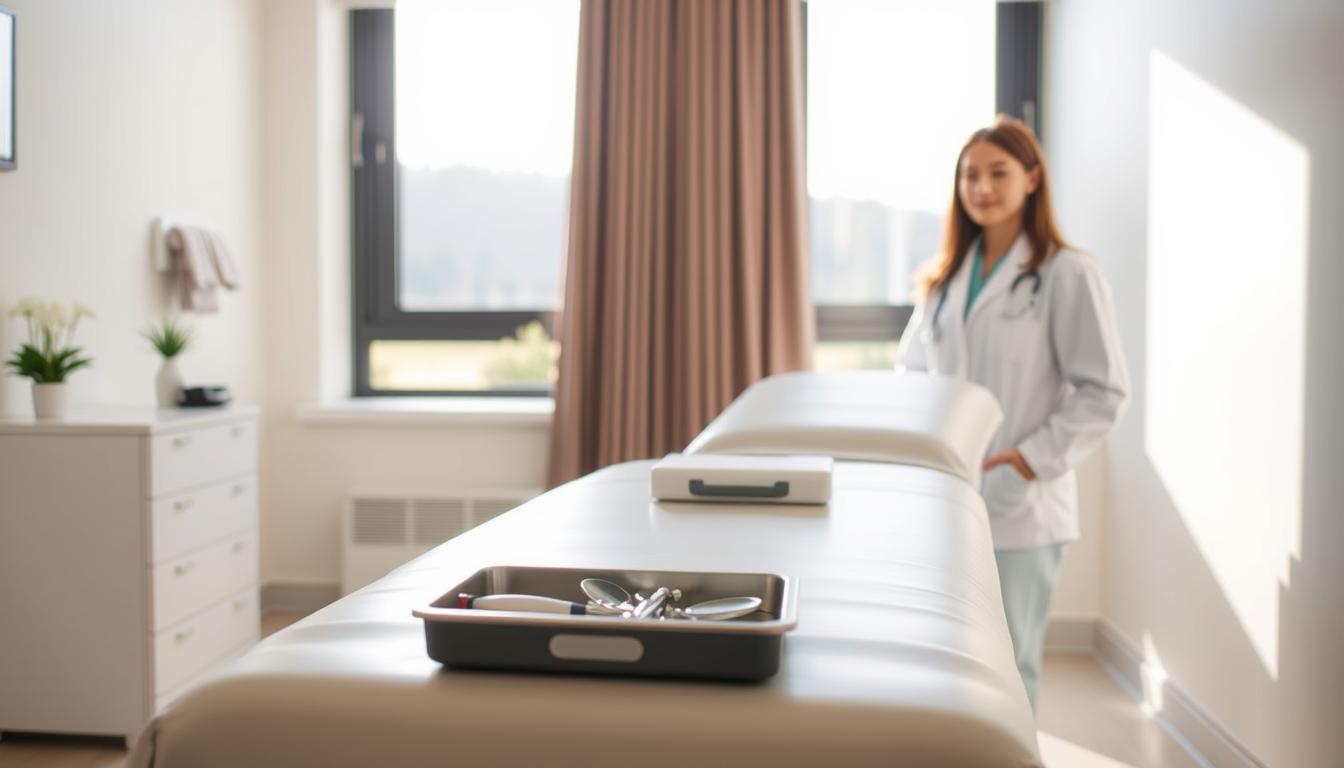Every woman’s path to wellness is unique, but a well woman exam is a key milestone. It’s not just about tests; it’s a chance to shape your health story. Whether you’re 18 or 40, this appointment is about you.
Preparation is key to making your voice heard. It’s about asking questions, sharing concerns, and leaving with clarity. Let’s make preparation a tool for empowerment.
Key Takeaways
- Annual exams start by age 18 or when becoming sexually active.
- Choosing a gynecologist by age 13-15 builds a foundation for lifelong care.
- Preparing includes tracking menstrual changes, listing questions, and sharing family health history.
- Tests like Pap smears and blood pressure checks are personalized to your age and risks.
- Self-pay options ensure access to care even without insurance.
What is a Well Woman Exam?
“Well-woman exams are important for a number of reasons. No. 1 is that they help you to establish care with a specialist so that if there is a problem down the road, you have a provider that you know and feel comfortable talking to,” says Ob/Gyn Amanda Elbin, MD.
Definition and Purpose
A well woman exam focuses on reproductive and sexual health for individuals with female anatomy. Providers review medical history and perform physical exams. They also discuss preventive care.
Key components include breast exams, pelvic exams, and Pap tests starting at age 21. The 5 for Life program allows patients to combine screenings like cervical checks and breast exams in one visit. What to expect during a well woman visit also includes discussions about contraception, menstrual health, and sexual activity.
Importance of Regular Check-ups
Regular visits are vital for early detection of conditions like cervical cancer, which affects 1 in 143 women. Women’s health check-up prep ensures providers can identify risks like HPV, which affects 79 million Americans. Annual exams after age 21 help track changes in health, such as fibroids (affecting 1 in 4 women) or endometriosis (1 in 10).
Studies show 90% of women with regular care report better health outcomes. Even after hysterectomy, check-ups address menopause symptoms like vaginal dryness (70% prevalence during menopause).
- Pap tests every 3-5 years for cervical cancer screening
- Clinical breast exams starting at 25, with mammograms from age 40
- STD testing annually for those under 25 or with new partners
Open discussions about family history and symptoms improve care quality. The American College of Obstetricians stresses that 50% of women lack knowledge about gynecological cancer risks—annual visits bridge this gap. What to expect during a well woman visit includes tailored advice based on age, lifestyle, and personal health goals.
Preparing for Your Appointment
Getting ready for a well woman appointment involves careful planning. Organizing details beforehand makes your visit efficient and stress-free. Here’s how to tackle each step confidently.
Scheduling the Exam
Timing is important. We suggest scheduling when you’re not menstruating for more accurate tests. But, don’t worry if your period comes early—exams can go ahead. Try to book for the middle of your cycle (days 3–14) for the best results.
If you need blood work, morning appointments are best. This is because you’ll need to fast beforehand.
- Schedule 2–3 days before or after your period for best results.
- Confirm if fasting is required for blood tests.
- Block off time in your calendar to avoid rushing.
Choosing the Right Healthcare Provider
Choosing the right healthcare provider is also part of preparation. Look for certified OB/GYNs, nurse practitioners, or midwives with women’s health expertise. Consider their communication style, gender preferences, and online reviews to build trust. Have a brief call to discuss their approach to patient care.
Good communication is essential. Providers who listen well and explain things clearly make you feel more at ease. Always check their certifications and if they accept your insurance. A good relationship with your provider helps you talk openly about health concerns, from menstrual changes to birth control.
What to Expect During the Exam
During a well woman exam, your provider will guide you through a structured process. This ensures thorough care. Here’s a clear breakdown of steps and procedures:
Overview of the Examination Process
Exams start with a review of your medical history and vital signs. This includes height, weight, and blood pressure. Our providers make sure you are comfortable and private, doing the physical exam in a secure setting.
The visit usually lasts 30–45 minutes. This allows time for questions about your health concerns.
Common Procedures and Tests
Key components of the exam include:
- Breast exam: Checking for lumps or changes using manual palpation.
- Pelvic exam: Assessing reproductive organs for irregularities. This is recommended annually for women aged 21–65.
- Pap smear: Collecting cervical cells to screen for HPV and cancer. Follow ACOG guidelines for intervals (every 3 years for ages 21–65).
| Procedure | Description | Frequency |
|---|---|---|
| Breast Exam | Manual check for abnormalities | Conducted at every annual visit |
| Pelvic Exam | Visual and manual assessment of reproductive organs | Yearly for women 21+ |
| Pap Smear | Cell collection for cervical cancer screening | Every 3 years (ages 21–65) |
| Blood Pressure Check | Baseline vital signs measurement | At every appointment |
“Routine exams are vital for early detection of conditions like cervical cancer,” states the American College of Obstetricians and Gynecologists.
Well woman exam tips include arriving early to complete paperwork and wearing comfortable clothing. Communicate openly about discomfort during procedures—we adjust techniques to prioritize your comfort. Remember, these visits are tailored to your health history, ensuring personalized care.
Essential Documents to Bring
Getting your paperwork ready is key for a smooth well-woman exam. Good gynecologist appointment preparation keeps your annual women’s health check list on track. Here’s how to gather everything you need.
Medical History and List of Medications
Begin by making a list of your medical history. Include past surgeries, chronic illnesses, and family health risks like breast or ovarian cancer. Also, track your menstrual cycle patterns and note any irregularities. Don’t forget to list your medications, including:
- Prescription drugs (dosages and frequency)
- Over-the-counter supplements and vitamins
- Sexual health history, including current medications for STIs or contraceptives
Insurance Information
Make sure you know your insurance details before you go. Bring:
- Insurance card and policy number
- Photo ID matching your records
- Referral forms if required by your plan
Check if your annual women’s health check list includes covered services like Pap tests or STI screenings. Talk about co-pay expectations to avoid surprises.
| Document | Why It’s Needed |
|---|---|
| Medical History Form | Identifies genetic risks and treatment conflicts |
| Medication List | Avoids drug interactions and improves diagnosis accuracy |
| Insurance Card | Streamlines billing and coverage verification |
Lifestyle Considerations Before the Exam
Getting ready for a well woman exam is all about making small changes. These changes help make the exam more accurate and comfortable. They are part of how to prepare for a well woman exam and self-care before a well woman exam. Let’s look at some steps you can take.
According to a 2020 study, 61% of OB-GYNs emphasize that well-woman care includes proactive lifestyle adjustments for better outcomes.
Dietary Recommendations
Start making changes 24–48 hours before your exam:
- Fast for 8 hours before the exam to ensure accurate blood test results.
- Avoid sexual activity 2–3 days prior to allow clear Pap smear results.
- Limit caffeine and alcohol the day before to reduce discomfort during the exam.
Maintaining Hydration
Staying hydrated is important for both lab work and comfort:
- Drink water regularly in the days leading up to your visit to support blood draws and urine tests.
- Reduce fluid intake 2 hours before the exam to avoid a full bladder during the pelvic exam.
These steps make sure your exam is both effective and stress-free. Making these small changes shows you care about your health. It’s all about self-care before a well woman exam.
Questions to Ask Your Healthcare Provider
Preparing a list of questions is a key part of gynecologist appointment preparation. Open communication helps you understand what to expect. It also addresses your personal concerns. Here are some tips to make the most of your discussion with your provider.
Inquiries About Health Concerns
Bring specific details about symptoms or changes, such as:
- Menstrual irregularities (e.g., spotting, prolonged bleeding)
- Sexual health concerns (e.g., STI risks, condom use)
- Birth control options and their side effects
- Mental health challenges like PMS or anxiety
Example: “Should I be tested for HPV given my family history?”
Clarifying Test Results
Ask for explanations of lab results and their implications:
- “What do these Pap smear results mean?”
- “Are my hormone levels within normal ranges?”
- “What follow-up steps are needed if results are abnormal?”
| Question | Why It Matters |
|---|---|
| How often should I get a Pap test? | Guidelines vary by age and history (e.g., every 3-5 years for most women) |
| Are my HPV vaccine updates current? | Prevents 90% of cervical cancers |
| Should I adjust my birth control method? | Addresses side effects or fertility goals |
Remember to ask about next steps, like follow-up visits or lifestyle changes. Taking notes helps you remember what was discussed. Open dialogue ensures you leave with clear next steps.
Addressing Emotional and Mental Preparedness
Getting ready for a well-woman exam is just as important as getting ready physically. Many women feel anxious, with up to 64% worried during pelvic exams. But talking openly with your doctor can help ease these worries.
We suggest talking about your fears, like pain or feeling embarrassed. Your doctor wants you to be comfortable. Anxiety can affect how well you receive care, so it’s key to address it.
Overcoming Anxiety About the Exam
Studies reveal 54.8% of women feel anxious during gynecologic visits. If past trauma or discomfort worries you, tell your doctor. They can use smaller tools or have someone else present for support.
The American College of Obstetricians and Gynecologists says pelvic exams are only done when needed. This can help reduce stress.
Tips for Staying Calm
- Practice deep breathing exercises before you go.
- Bring a trusted friend to wait with you for support.
- Ask for self-care before a well woman exam with rest and mindfulness.
- Arrive early to calm down and avoid stress from rushing.
- Talk about what you prefer, like lighting or music, to make your visit more comfortable.
Remember, being mentally ready for a well woman appointment is part of the process. Our team is trained to make sure your visit meets your emotional needs. Be open and kind to yourself—your comfort is our top priority.
Understanding the Importance of Screening Tests
Screening tests are key for women’s health. They catch problems early, like Pap smears and breast exams. These tests are part of preventive care.
As annual well-woman exams show, they save lives. They find conditions when they’re easiest to treat.
Pap Smears and HPV Testing
- Pap smears are needed every three years for women 21–65. More tests might be needed if results are abnormal.
- HPV testing goes with Pap smears for women 30+ to find high-risk strains of cervical cancer.
- These tests find changes before symptoms show up. They cut cervical cancer risks by 80% or more.
Early detection is key—don’t skip these screenings even if you feel healthy.
Breast Health Assessments
Clinical breast exams check for lumps or changes. Providers feel your breast tissue while you lie on an exam table. Self-checks are good, but exams catch things patients might miss.
The American College of Obstetricians and Gynecologists says these exams are vital. They find early signs of breast cancer.
When getting ready for a women’s health check-up, share your family’s cancer history. This helps decide how often and what tests you need. Remember, these screenings are free under the Affordable Care Act. This makes it easier for women to take care of their health.
After Your Exam: Follow-Up Care
After a well woman exam, it’s important to follow up to keep your health on track. Here’s how to handle the next steps.
Understanding Test Results
Test results may come through patient portals, email, or mail. Normal results mean you don’t need to take action right away. But, if you see terms like “abnormal cells,” ask questions.
For example, cervical cancer screening guidelines suggest Pap tests every 3 years for most women. If your results need follow-up care, book a visit quickly. Early detection is key. As
the American Cancer Society notes, early cervical cancer detection reduces mortality by up to 80%.

Schedule Your Next Visit
Before you leave the office, plan your next annual women’s health check list. Use this table to guide your routine:
| Screening | Recommendations |
|---|---|
| Pap Smears | Every 3 years for ages 21–29 |
| HPV + Pap Co-Testing | Every 5 years for ages 30–65 |
| Mammograms | Start at 40 (annual), or 45+ for biennial |
Set reminders for follow-ups. Even if you feel fine, yearly exams catch problems early. Women who go for yearly exams manage chronic conditions better. If you have urgent needs, contact your provider.
- Save test result summaries for your health records
- Update your annual women’s health check list with provider recommendations
- Review your personalized screening timeline
Proactive follow-up care makes check-ups a lifelong health partner. Stay informed, stay healthy.
Location Information for Our Clinics
Finding the right location is the first step for a well woman appointment. Our clinics in Central Florida make it easy to get care. Choose the one closest to you from our list below.
Orange City Office Details
Our main Orange City Office is at 938 Saxon Blvd Suite D, Orange City, FL 32763. Call us at (352) 259-2159 to schedule. We’re open Monday-Friday, 8:30 am–5:00 pm.
Free parking is available, and the building is easy to get to. You’ll find the Orange City Post Office and Walmart Supercenter nearby.
Other Convenient Locations
We also have clinics in other parts of Central Florida:
- Orlando – Semoran Blvd: 1277 N Semoran Blvd Suite #102, Orlando, FL 32807
- Orlando – Windermere Rd: 8958 Conroy Windermere Rd, Orlando, FL 32835
- St. Cloud: 4589 Henry C Yates Ln, St Cloud, FL 34769
- Kissimmee: 910 W Vine St, Kissimmee, FL 34741
All clinics have the same phone number and hours. For tips on getting ready for your appointment, visit healthfinder.gov. Let us know about any special needs when you book your visit.
How to Contact Us
Getting ready for a well woman appointment is easy. Just reach out to our team anytime. You can schedule visits, ask questions, or get exam tips. We’re here to make your visit smooth.
Phone Numbers and Hours of Operation
Call us at (352) 259-2159 from Monday to Friday, 8:30 AM–5:00 PM. Our team speaks English and Spanish. A scheduler will help with appointment times, insurance, or exam tips. For urgent needs, call the same number for quick help.
Online Appointment Scheduling
Book online at Premier Medical’s website. Here’s how:
- Create an account or log in
- Select “Well-Woman Exam” under services
- Choose a location: Davenport, Mt. Dora, Clermont, or others
- Pick a date/time slot
| Location | Address | Phone |
|---|---|---|
| Davenport | 40230 US Hwy 27 Suite #130 Davenport, FL 33837 | (352) 259-2159 |
| Mt. Dora | 111 Waterman Ave Mt Dora, FL 32757 | (352) 259-2159 |
| Clermont | 15701 FL-50 Suite #201 Clermont, FL 34711 | (352) 259-2159 |
Not sure what to do? Text or email us at info@premiermedicalassociate.us. We care about your comfort. Let us help you get ready for your well woman exam.
Frequently Asked Questions
Getting ready for a well-woman exam? Here’s a guide to common questions and answers. It will help your visit go smoothly.

Common Concerns About the Well Woman Exam
Here are answers to questions we hear most often:
- Will the exam hurt? Most patients say it’s uncomfortable but not painful. We use gentle techniques to make it as easy as possible.
- How long does the visit take? The well woman visit usually lasts 30 minutes. This includes time for discussion and testing.
- Can I choose my provider’s gender? Yes—you can choose a provider you feel comfortable with.
- Should I cancel if I’m menstruating? No. We can do tests unless your flow is very heavy. Well woman exam tips include wearing comfortable clothes for easy gown changes.
- Are first visits different? Initial visits may take longer for health history review. But all visits include the same three steps: pelvic exam, Pap smear, and breast exam.
What to Do if You Miss Your Appointment
If you miss your visit, act quickly:
- Call us immediately to reschedule. Late cancellations may incur a $50 fee.
- Reschedule within 30 days to stay on track with preventive care. Delaying exams risks missing early signs of conditions like cervical cancer.
- Don’t wait for symptoms. Early detection through Pap tests saves lives—cervical cancer survival rates improve with early diagnosis.
Remember: Your health is a priority. Let us help you stay on schedule!
Insurance and Payment Options
Knowing your coverage is essential for your annual women’s health check list. We take many insurance plans, including Medicare, Medicaid, and those from the marketplace. Let’s look at how to handle costs and coverage.
Accepted Insurance Plans
The Affordable Care Act makes proactive health measures for women’s wellness like Pap tests and breast exams free. Most insurers cover 100% for preventive services, including:
- Blood pressure and BMI checks
- Cervical cancer screenings (Pap tests)
- Mammograms starting at age 40-50
- STD and diabetes screenings
Medicare members get a limited gynecologic exam and annual wellness visits. Bring your insurance card to check coverage.
Patient Financing Solutions
We have flexible options for those without insurance or with high deductibles. You can choose from:
- Sliding fee scale based on income
- Payment plans for out-of-pocket costs
- State/federal program eligibility checks
Our team checks coverage before and gives cost estimates for non-preventive services. Need help? Call billing at (555) 123-4567.
Community Resources and Health Education
Learning about women’s health starts with easy-to-find resources. Our clinics and partners offer tools to help you get ready for a well woman exam. They also keep you informed all year.
Local Workshops and Seminars
Free workshops are available in Florida, including Orange City and other areas. Topics include breast health, menopause, and reproductive wellness. Visit our website to sign up for sessions like:
- Breast Cancer Awareness: Monthly screenings and risk reduction strategies
- Menopause Management: Hormonal changes and lifestyle adjustments
- Diabetes Prevention: Nutrition tips for women at risk
Workshops on postpartum care and sexual health are also available. Check our event calendar for dates and locations.
Online Health Resources and Literature
Here are trusted resources to improve your health knowledge:
| Resource | Description |
|---|---|
| Office on Women’s Health (OWH) | Guidance on screenings, vaccines, and reproductive health |
| Centers for Disease Control (CDC) | Up-to-date guidelines on cervical cancer screening and immunizations |
| MyChart App | Track menstrual cycles and prepare for your next well woman exam |
“Annual preventive care visits are vital for catching health issues early,” states the 2024 Women’s Preventive Services Initiative. “Education empowers patients to make informed decisions about their care.”
Our patient portal has guides on cholesterol screening, osteoporosis prevention, and gestational diabetes management. These materials meet the ACA’s preventive care mandates, so you won’t pay out-of-pocket for eligible services. Check out these resources to take control of your health today.
Staying Informed About Women’s Health
Women’s wellness needs more than just annual exams. Stay informed and active to take control of your health. This helps improve women’s healthcare for everyone.
Health News and Updates
Sign up for our newsletter or follow the CDC or Planned Parenthood. Get the latest on screenings like Pap tests and mammograms. Stay updated on HPV testing and cervical cancer prevention.
Talk to your doctor about new research. This helps make your care plan better. Knowing the latest, like avoiding douches before Pap tests, is key.
Advocacy and Support for Women’s Health Issues
Support National Women’s Health Week or donate to research. Join groups like NWHIC to fight for equal care. Share your story to help others and reduce shame around topics like menopause.
Your voice matters in shaping policies and care access. Make sure tests for bone density and mental health are a priority.


